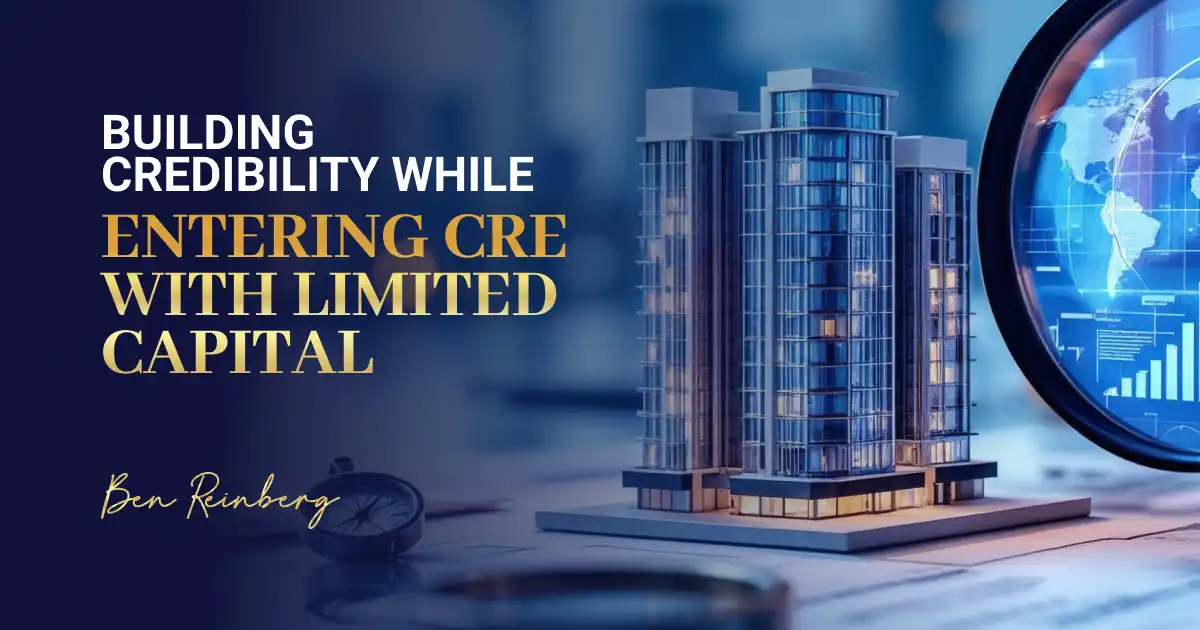
Why Real Estate is the Foundation of Wealth Creation
March 13, 2024
Discover the transformative power of a wealth mindset in real estate investment.
Read More >>>
You don’t need Wall Street experience to break into one of the world’s most powerful wealth-building industries. Many aspiring investors assume they need years of financial expertise or significant capital before taking their first step. In reality, commercial real estate (CRE) rewards specialized skills, like deal structuring, property analysis, market evaluation and relationship management, over pedigree. With the proper focus, anyone can step confidently into this space and start building lasting wealth.
CRE is one of the few industries where driven individuals from diverse fields, including law, finance, healthcare, engineering and operations, can leverage their expertise to establish credibility and create measurable impact. Transferable strengths, such as negotiation, strategic planning and project oversight, often translate directly into successful roles in acquisitions, asset management and property development.
Sustainable success in real estate comes from mastering fundamentals, building strong industry relationships, applying rigorous due diligence and making disciplined, data-driven decisions. These are the entry points that enable newcomers to gain traction, shorten the learning curve and establish long-term authority in a competitive market, regardless of prior investing experience.

One of the biggest misconceptions about commercial real estate investing is that you need to be a seasoned investor before getting started. In reality, success stems from applying the right skills, building industry knowledge and maintaining a willingness to learn, rather than already owning a portfolio. When I started, I didn’t have a portfolio; I had hustle, discipline and a hunger to learn. That’s all you need. The real advantage lies in recognizing the opportunities already within your reach and using your existing strengths to step confidently into the industry.
Leverage Skills You Already Have
Many people underestimate the value of their existing experience. If you’ve negotiated contracts, managed budgets, built client relationships or solved complex problems in another industry, you already have a foundation that translates directly into CRE. Those abilities don’t just carry over; they give you a genuine edge when evaluating deals and navigating transactions.
Plenty of Ways In
There isn’t just one door into commercial real estate investing. You might begin as a:
Each path offers hands-on exposure to underwriting, deal structuring and portfolio growth. If you’re weighing your options and wondering how to invest in commercial real estate, exploring the differences between commercial and residential real estate can help clarify where your skills fit best and which path aligns with your long-term goals.
An Expanding Market
The U.S. Bureau of Labor Statistics projects steady growth in real estate careers through 2032. That means more opportunities for new professionals to establish themselves, build expertise and grow into leadership roles. For those willing to commit, the timing has never been better to break in and start building credibility in the industry.

Breaking into CRE doesn’t require deep pockets or years of prior experience. What matters most is building industry knowledge, forming the right connections and gaining practical exposure to how deals are sourced, financed and managed. You don’t need money to gain respect in CRE, you need discipline, due diligence and confidence.
Here are four proven entry-level paths for professionals ready to start a successful career in CRE.
Networking is the foundation of long-term success in CRE. Attend local real estate events and connect with industry leaders who possess decades of experience in deal structuring and asset management. A mentor provides valuable insights into underwriting, negotiations and due diligence, helping you avoid mistakes and accelerate your growth.
One of the fastest ways to enter the industry is by participating in CRE syndications. These partnerships allow beginners to pool resources with seasoned investors, gaining exposure to multifamily, office and industrial assets without needing millions in capital. Even a modest contribution gives you a front-row seat to learn how strategies drive portfolio growth and build long-term wealth.
Practical roles, such as leasing, property management, acquisitions or brokerage, provide an excellent foundation. These positions expose you to financial modeling, tenant negotiations and market analysis skills critical to success in development and asset management. For example, aspiring leasing professionals can benefit from step-by-step guides that outline proven strategies for mastering this pivotal function.
Earning a real estate license, pursuing CRE-focused certifications or completing specialized coursework in underwriting, acquisitions and portfolio management demonstrates commitment. Education not only adds legitimacy but also prepares you to compete in a competitive job market. Organizations like the Small Business Administration (SBA) also offer valuable training and career development opportunities.

Breaking into commercial real estate investing doesn’t require substantial capital up front. What sets professionals apart is the ability to master foundational investment principles while applying practical, low-cost strategies that demonstrate credibility and attract the right partners.
These approaches work best in combination. Cap rate knowledge sharpens wholesaling negotiations, while valuation expertise adds leverage in joint ventures. Layering these skills establishes you as a professional capable of identifying and executing competitive commercial property opportunities.
You don’t need years of investing experience to succeed in CRE. The fastest way to shorten your learning curve is to learn directly from those who have already achieved lasting success.
Ben Reinberg built a $500M+ portfolio with a 28% historical internal rate of return (IRR), starting from scratch without generational wealth. His book shows you how to do the same. Inside, he breaks down the fundamentals, lessons learned and disciplined approaches that shaped his career.
Combined with mastering core skills, forming the right partnerships and recognizing opportunities others overlook, this knowledge equips you to step confidently into deals and steadily scale toward ownership.
Get the roadmap. Start small, apply the beginner’s guide principles and grow into long-term wealth and leadership in CRE.
You don’t need to be rich to start in commercial real estate investing. Start small, find mentors and keep stacking knowledge and relationships. That’s exactly how I built my first deals. Most beginners enter the industry through entry-level roles, syndications or by partnering with experienced investors. Focus on learning deal evaluation, property analysis and networking. The money comes later; discipline and exposure come first.
There isn’t one perfect blueprint for commercial real estate investment strategies for beginners. It depends on your goals, but here’s what works:
This is the same disciplined, step-by-step approach I followed and it’s how you reduce risk while building long-term wealth.
Success in commercial real estate investing isn’t about luck; it’s about education, relationships and execution. You need to master due diligence, understand market cycles and make disciplined decisions. Build credibility with certifications, know your numbers and source great deals. That’s how I scaled to a $500M+ portfolio with a 28% historical IRR: Consistency, partnerships and a long-term strategy.
Yes, CRE is a good investment right now if you approach it with the proper framework. Demand for multifamily, healthcare and industrial assets is growing, presenting an opportunity for both new and seasoned investors. Every market has risks, but proven strategies help you spot value and navigate challenges. I’m still finding great deals today and, if you stay disciplined, you can too.
